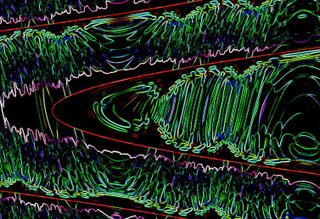Does your work with string theory make you more or less religious?
I think it partly depends on your exact definition of religious. If it means the traditional notion of going to services and some organized religion, then the answer is no. If it means, does it fill me with a sense of awe and wonder about the universe, does it fill me with a sense of how remarkable it is that the pieces of the universe fit together with such logical cohesion, does it fill me with this unshakable sense that there is an underlying order and harmony behind the universe, then to all of those I would say absolutely, yes. For some people, that is religion.
I could not have said it better. When I speak of religion and the Freedom of Religion as it is promised in our First Amendment, this is what I mean. It is the Freedom of Thought, the choice to believe in whatever reasons you want to explain the "underlying order and harmony behind the universe."
I realize that many bad things have been done in the name of religion, but the same is true of any idea. I can't think of a single idea that is exempt from being abused and misused. Does that mean that all ideas should be discounted? Of course not. So why do so many people think that eliminating religion and religious thinking will accomplish anything?
The answer is, and it's so simple, respect for others' rights. Sure, you can think that you are right and everyone else is wrong. But when it comes to actions, we do not have unlimited freedom to trample all over everyone else's beliefs. You can tell people they are wrong, but you can't enforce or impose your own beliefs on them. You just have to agree to disagree. If everyone could do that there would be more peace.
What’s your favorite conspiracy theory?
The most fun one is that God created the universe. But would one consider that a conspiracy? Certainly it arises from a lot of individuals collectively believing in something, which to me is wonderful because it’s a wonderful point of departure for so many ways of thinking about things. I love the fact that you’ve got individuals such as myself trying to figure out the universe using math and equations. You’ve got other people trying to figure out the origins of the universe from philosophical concerns, others that are approaching it from a theological direction. My brother is a Hare Krishna, and for years every time we’ve had a breakthrough in physics I tell him about it and he says, “Oh, yes, we know of that. It’s in Vedic text number 16,” or something like that. To me it’s always difficult to make sense of the resonances between what you find in sacred texts and what we find in science, because often times it’s a similarity of language or a similarity of perspective — but they’re really not exactly the same by any stretch of the imagination. But I do find it compelling that human thought, trying to answer the same question how the universe began, brushes up against similar concepts [as science] now and then.
That's a funny way of putting it, as a "conspiracy theory."
I've thought a lot about how the religious and philosophical ideas about ourselves, our origins and universe began and evolved with our increasing knowledge. In many ways it probably seems like modern people are much smarter than ancient people. But I wonder if that's really true. There seems to be a difference between amount of knowledge and ability to reason. Humans have had this reasoning ability for a very long time. In the past I'm certain that some people had intuited basic Truths about our existence but were limited by their language and knowledge in how they explained it. That would explain how many sacred texts contain some of the 'same' information as recent scientific discoveries. They are just put into different terms and symbols. I've said it before, and I'll say it again. The development of symbolic and religious thinking is one of the characteristics that separated us from the "apes". One of the "pillars of civilization."
I have never intended to sound like I put religion above science or "rationality." If anyone has thought that, then they simply haven't been paying attention or trying to understand me. I'm sorry if my communication isn't always clear and if that is the reason for any confusion. Anyway, if we use Greene's definition of religion, "unshakable sense that there is an underlying order and harmony behind the universe," you will realize that without it we never would have bothered to invent science at all. Science is the process of discovering that underlying order. Religion is the celebration of it.
Incidentally, a friend of mine has experienced a real and genuine miracle last week. I would like to explain it explicitly, but due to privacy concerns she really doesn't want me to talk about it. But allow me to say this much. What happened absolutely cannot be explained away unless you want to say that the best and most unexpected solution out of 10^500 jumped out and said, "Here I am!" ;-) Really and truly, and you just have to trust my judgment about it, the one thing that no one even imagined could happen did happen. The series of events leading up to it were so convoluted and uncertain that it seemed completely impossible. But as they say, in God all things are possible. Miracles really do happen.




